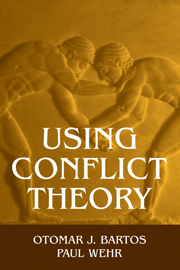Book contents
- Frontmatter
- Contents
- List of Figures and Tables
- Acknowledgments
- 1 Introduction
- 2 Understanding Conflict
- 3 Development of Incompatible Goals
- 4 Application to the Civil Rights Struggle
- 5 Emergence of Overt Conflicts
- 6 Application to a University Conflict
- 7 Escalation and Deescalation
- 8 Application to Conflict in Bosnia
- 9 Making Conflict Work Economically
- 10 Understanding and Managing Conflicts
- Appendix: Prelude to the Dissolution of Yugoslavia
- Notes
- References
- Index
3 - Development of Incompatible Goals
Published online by Cambridge University Press: 05 June 2012
- Frontmatter
- Contents
- List of Figures and Tables
- Acknowledgments
- 1 Introduction
- 2 Understanding Conflict
- 3 Development of Incompatible Goals
- 4 Application to the Civil Rights Struggle
- 5 Emergence of Overt Conflicts
- 6 Application to a University Conflict
- 7 Escalation and Deescalation
- 8 Application to Conflict in Bosnia
- 9 Making Conflict Work Economically
- 10 Understanding and Managing Conflicts
- Appendix: Prelude to the Dissolution of Yugoslavia
- Notes
- References
- Index
Summary
much of this book is about understanding social conflicts. Why did World War II occur? Why do I and my husband fight so often over trivial matters? Why does the Palestinian conflict continue to fluctuate between escalation and deescalation? There are three different ways to answer such questions: to look at the origins of conflict, to consider conflict actions, and to focus on conflict dynamics. This chapter considers the first problem, origins due to goal incompatibility.
Clearly, there are any number of specific reasons why two conflict actors can have incompatible goals. But it is possible to subsume them under three main headings: contested resources, incompatible roles, and incompatible values. This point is so important that it is worth representing it graphically (see Figure 3.1).
Contested Resources
As the term suggests, resources are contested when a party wants some of the resources the other party has or when both adversaries want the same unallocated resource. Let us consider the main types of such resources, and then ask why a party may want more than it has already.
Frequently Contested Resources
Humans can fight about a bewildering variety of things: about money, about land, about children, about infidelity, about politics. And yet it is possible to reduce this perplexing variety by classifying resources into three main categories: wealth, power, and prestige (Weber [1922] 1947).
Wealth Because the first of the three main resources, wealth, usually involves “tangibles,” it is easiest to understand.
- Type
- Chapter
- Information
- Using Conflict Theory , pp. 29 - 49Publisher: Cambridge University PressPrint publication year: 2002



